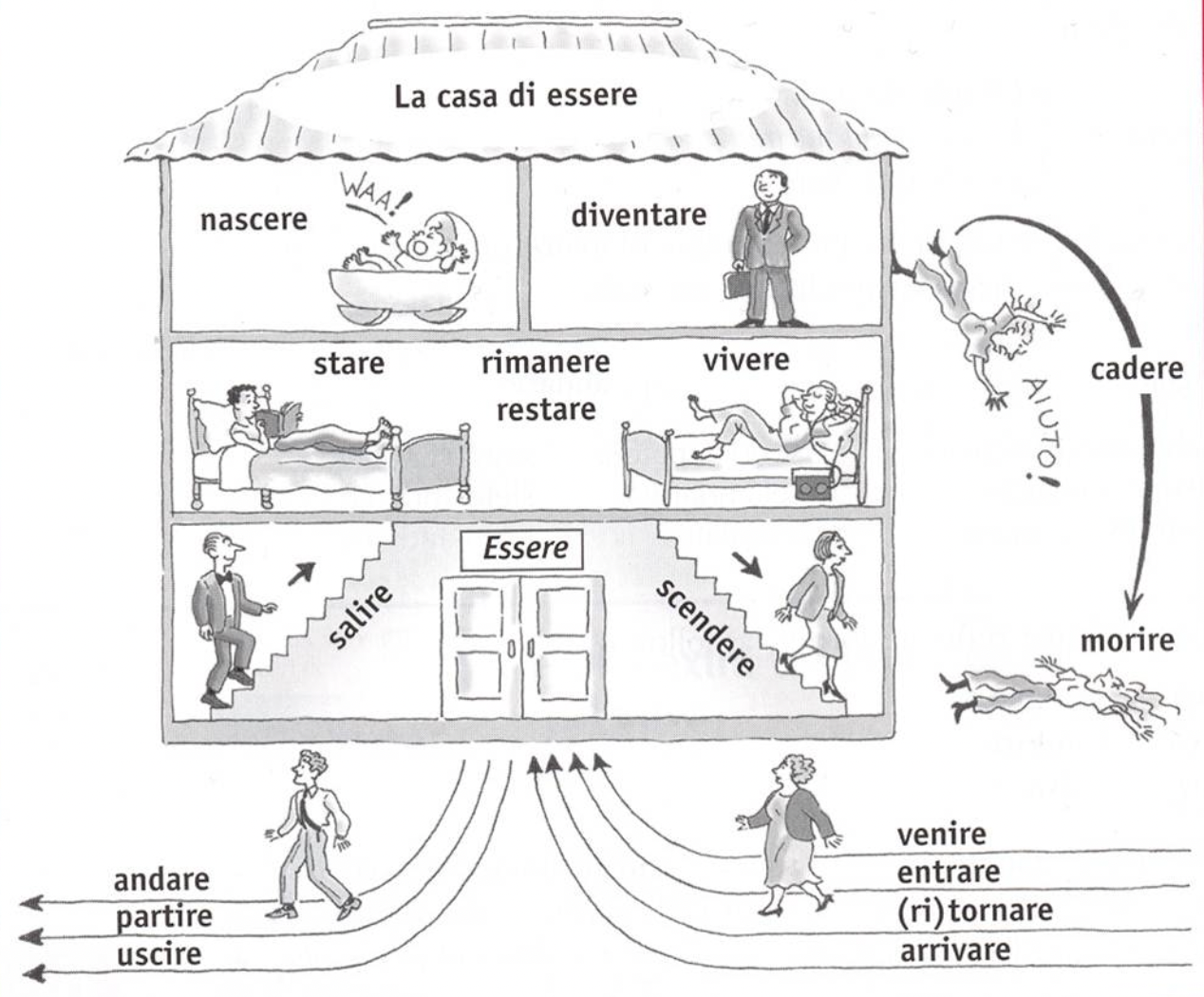Choosing the Correct Auxiliary Verb in Italian
In Italian, many tenses are compound tenses — meaning they use two parts: an auxiliary verb (avere or essere) plus a past participle. One of the most common compound tenses is the passato prossimo, which works like the English simple past (I ate) or present perfect (I have eaten).
Which Auxiliary Verb to Use?
In Italian, compound tenses always use either avere or essere as the auxiliary:
- Ho mangiato — I have eaten / I ate (avere as the auxiliary)
- Sono andato/a — I have gone / I went (essere as the auxiliary)
The Classic Rule
Textbooks often explain it like this:
- Transitive verbs (verbs that take a direct object) use avere.
- Intransitive verbs (verbs that don’t take a direct object) use essere.
However, this rule can be confusing for learners — deciding whether a verb is transitive or intransitive isn’t always obvious!
A Simpler Rule for Learners
Here’s what I teach my students instead:
? Forget the transitive/intransitive rule.
? Memorize the short list of verbs that use essere — known as the Casa di Essere (House of Essere).
This list includes about a dozen high-frequency verbs, mostly verbs of motion or change of state — like andare (to go), nascere (to be born), arrivare (to arrive), entrare (to enter), uscire (to go out), morire (to die), diventare (to become), and so on.
While some grammar books say that motion verbs use essere, there are exceptions: for example, camminare (to walk) and viaggiare (to travel) use avere, even though they express movement.
So, to avoid confusion, don’t rely on motion or transitivity and learn the Casa di Essere by heart!
La Casa di Essere: The Most Common Italian Verbs That Use Essere

List of the most common Italian verbs that use essere in the passato prossimo
| Infinitive Verb | Passato Prossimo | English Translation |
|---|---|---|
| Andare | Sono andato/a | I went or I’ve gone |
| Partire | Sono partito/a | I left or I’ve left |
| Uscire | Sono uscito/a | I went out or I’ve gone out |
| Arrivare | Sono arrivato/a | I arrived or I’ve arrived |
| Venire | Sono venuto/a | I came or I’ve come |
| Entrare | Sono entrato/a | I entered or I’ve entered |
| Ritornare | Sono ritornato/a | I came back or I’ve come back |
| Tornare | Sono tornato/a | I came back or I’ve come back |
| Stare | Sono stato/a | I stayed or I’ve stayed |
| Rimanere | Sono rimasto/a | I remained or I’ve remained |
| Restare | Sono restato/a | I remained or I’ve remained |
| Scendere | Sono sceso/a | I went down or I’ve gone down |
| Salire | Sono salito/a | I went up or I’ve gone up |
| Diventare | Sono diventato/a | I became or I’ve become |
| Nascere | Sono nato/a | I was born |
| Cadere | Sono caduto/a | I fell or I’ve fallen |
| Morire | È morto/a | He/she died |

Test Your Italian
Not sure what your Italian level is? I’ve created a free online Italian test to help you determine it.How to Conjugate Essere Verbs in the Passato Prossimo
When using the passato prossimo with essere as the auxiliary verb, the past participle must agree in gender and number with the subject. This means the ending of the past participle changes to match whether the subject is masculine, feminine, singular, or plural.
For example:
- Le ragazze sono andate a scuola. (The girls went to school. — feminine plural)
- Luca è andato a scuola. (Luca went to school. — masculine singular)
- Anna è andata a scuola. (Anna went to school. — feminine singular)
- I ragazzi sono andati a scuola. (The boys went to school. — masculine plural)
Example: Conjugation of andare in the Passato Prossimo
| Io | Sono andato/a | I have gone or I went |
| Tu | Sei andato/a | You have gone or you went |
| Lui/Lei | È andato/a | He/she has gone or he/she went |
| Noi | Siamo andati/e | We have gone or we went |
| Voi | Siete andati/e | You all have gone or you all went |
| Loro | Sono andati/e | They have gone or they went |
Essere and Reflexive Verbs
In Italian, reflexive verbs conjugated in the passato prossimo (present perfect) always use essere as the auxiliary verb instead of avere. This is an important rule in Italian grammar.
When using essere with reflexive verbs, the past participle must agree in gender and number with the subject of the sentence.
For example:
- Ci siamo divertite. (We had fun. — feminine plural)
- Mi sono svegliato presto. (I woke up early. — masculine singular)
- Mi sono svegliata presto. (I woke up early. — feminine singular)
- Ci siamo divertiti. (We had fun. — masculine plural or mixed group)
Example: Conjugation of alzarsi (to get up) in the Passato Prossimo
| Io | Mi | Sono alzato/a | I got up |
| Tu | Ti | Sei alzato/a | You got up |
| Lui/Lei | Si | È alzato/a | He/she got up |
| Noi | Ci | Siamo alzati/e | We got up |
| Voi | Vi | Vi siete alzati/e | You all got up |
| Loro | Si | Si sono alzati/e | They all got up |
Read more:








